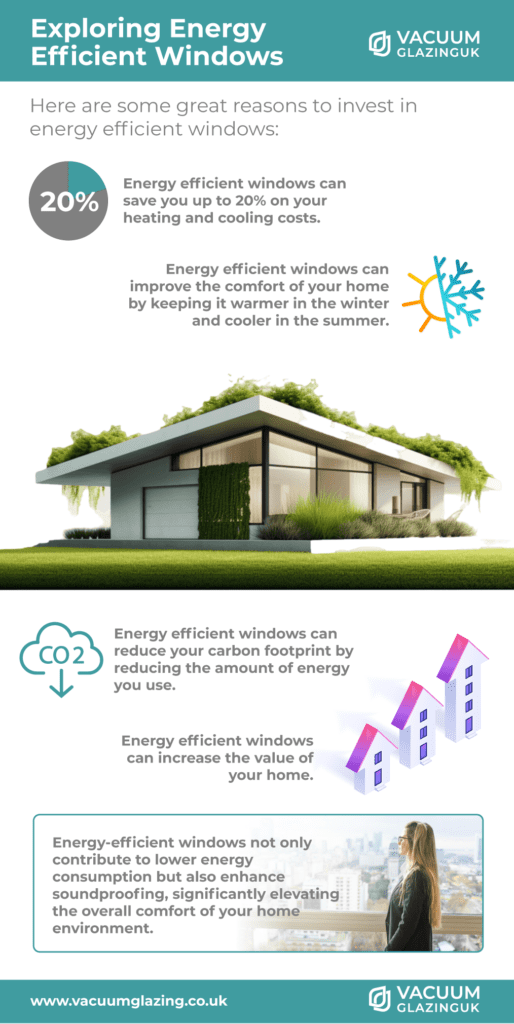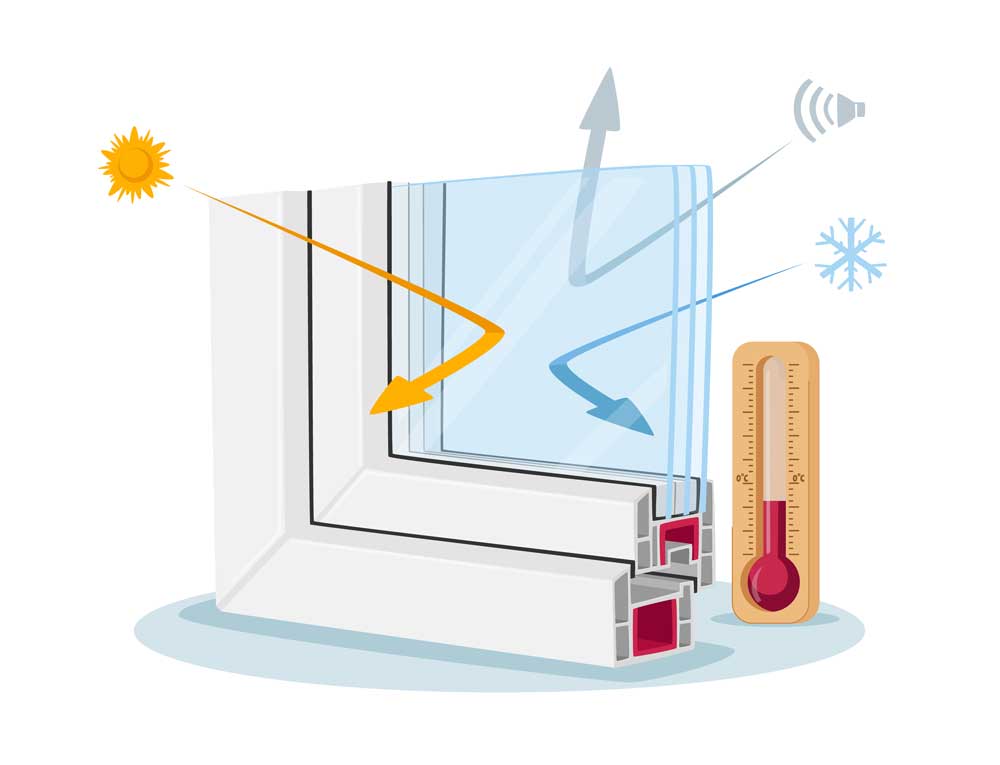
Exploring Energy Efficient Windows
Energy efficient windows are becoming increasingly popular as people look for ways to save energy and reduce their carbon footprint. […]
Energy efficient windows are becoming increasingly popular as people look for ways to save energy and reduce their carbon footprint. Energy efficient windows work by reducing heat loss and heat gain, which can help to save money on heating and cooling costs.
There are many different types of energy efficient windows available, but the most common type is double-glazed windows with low-emissivity (low-E) glass. Low-E glass is a special type of glass that has a coating that reflects infrared radiation, which is the type of radiation that heat travels through. This coating helps to keep heat from escaping through the window, which can save energy.
In addition to the type of glass, the frame material can also affect the energy efficiency of a window. Wood frames are generally the most energy-efficient, followed by vinyl frames and aluminium frames.
Energy efficient windows can save you money on your energy bills, improve the comfort of your home, and reduce your carbon footprint. If you are considering replacing your windows, be sure to choose energy efficient windows to get the most benefits.
Here are some great reasons to invest in energy efficient windows:
- Energy efficient windows can save you up to 20% on your heating and cooling costs.
- Efficient windows can improve the comfort of your home by keeping it warmer in the winter and cooler in the summer.
- Energy efficient windows can reduce your carbon footprint by reducing the amount of energy you use.
- Energy efficient windows can increase the value of your home.

The most energy-efficient replacement window is a double-glazed window with low-emissivity (low-E) glass. Low-E glass is a special type of glass that has a coating that reflects infrared radiation, which is the type of radiation that heat travels through. This coating helps to keep heat from escaping through the window, which can save energy.
Vacuum insulated glass (VIG) is a new technology that has further improved the performance of energy efficient windows. VIG is made up of two panes of glass that are separated by a vacuum. The vacuum creates an airless space that helps to prevent heat transfer. VIG windows are even more energy-efficient than double-glazed windows with low-E glass, and they can save you even more money on your energy bills.
- VIG windows are more expensive than double-glazed windows with low-E glass, but they can save you more money on your energy bills in the long run.
- When choosing energy efficient windows, it is important to consider the climate of your area. If you live in a cold climate, you will need windows that are more energy-efficient than if you live in a warm climate.
No, larger windows are not more energy-efficient. In fact, larger windows can actually lose more heat than smaller windows. This is because larger windows have more surface area, which means that more heat can escape.

The most efficient window frame material is wood. Wood is a natural insulator, which means it is good at preventing heat from transferring through it. Wood frames are also typically thicker than vinyl or aluminium frames, which can further improve their energy efficiency.
Here is a comparison of the energy efficiency of different window frame materials:
- Wood: Wood is the most energy-efficient window frame material. It is a natural insulator and can prevent heat from transferring through it. Wood frames are also typically thicker than vinyl or aluminium frames, which can further improve their energy efficiency.
- uPVC: uPVC is a good insulator, but it is not as good as wood. uPVC frames are also typically thinner than wood frames, which can reduce their energy efficiency.
- Aluminium: Aluminum is a poor insulator, which means it is not good at preventing heat from transferring through it. Aluminium frames are also typically the thinnest of the three materials, which can further reduce their energy efficiency.
- Steel: LIke Aluminium, steel is a poor insulator and is rarely used in modern window frames.
Here is a table that shows the U-values of different window frame materials:
| Material | U-value |
|---|---|
| Wood | 2.0-3.0 W/m2K |
| Aluminum | 2.0-2.5 W/m2K |
| Vinyl | 1.5-2.0 W/m2K |
| Steel | 0.8-1.5 W/m2K |
Here are some additional things to consider when choosing a window frame material:
- Cost: Wood frames are typically more expensive than vinyl or aluminium frames.
- Maintenance: Wood frames require more maintenance than vinyl or aluminium frames. They need to be painted or stained every few years to protect them from the elements.
- Durability: Wood frames are more durable than vinyl or aluminium frames. They can withstand more wear and tear.
- Appearance: Wood frames can give your home a more traditional look, while vinyl or aluminium frames can give your home a more modern look.
Ultimately, the best window frame material for you will depend on your individual needs and preferences. If you are looking for the most energy-efficient window frame material, then wood is the best choice. However, if you are looking for a more affordable option, then vinyl or aluminium may be a better choice.
The type of windows that would save energy depends on a number of factors, including the climate of your area, the size and shape of the windows, and your budget.
Some of the most efficient windows include:
- Double-glazed windows with low-emissivity (low-E) glass: Low-E glass is a special type of glass that has a coating that reflects infrared radiation, which is the type of radiation that heat travels through. This coating helps to keep heat from escaping through the window, which can save energy.
- Triple-glazed windows: Triple-glazed windows have three panes of glass instead of two, which can provide even more insulation than double-glazed windows.
- Windows with argon or krypton gas between the panes of glass: These gases are inert, which means they do not conduct heat well. This can help to improve the energy efficiency of the windows.
- Windows with a vacuum cavity: These are the most energy efficient windows as a vacuum is the best insulator.
- Windows with wood frames: Wood is a natural insulator, which means it is good at preventing heat from transferring through it. This can make wood-framed windows more energy-efficient than windows with vinyl or aluminum frames.
When choosing energy-efficient windows, it is important to consider all of the factors that affect their energy efficiency. You should also get quotes from several different window companies to compare prices.
Here are some additional tips for choosing energy-efficient windows:
- Consider the climate of your area. If you live in a cold climate, you will need windows that are more energy-efficient than if you live in a warm climate.
- Make sure the windows are properly installed. Improper installation can reduce the efficiency of the windows.
Other Things to Consider When Choosing Energy-Efficient Windows
In addition to the factors mentioned above, there are a few other things to consider when choosing energy-efficient windows:
- U-Value: The U-Value is a measure of how well a window insulates. The lower the U-Value, the better the window insulates. A good U-Value for energy-efficient windows is 1.0 or lower.
- Solar Heat Gain Coefficient (SHGC): The SHGC is a measure of how much solar heat a window lets in. The lower the SHGC, the less solar heat the window lets in. A good SHGC for energy-efficient windows is 0.3 or lower.
- Warranty: The warranty is a guarantee that the windows will be free from defects for a certain period of time. Make sure to get a warranty that is long enough to cover the lifespan of the windows.
- Security/Safety: New high performance windows can also be made with security features, such as impact-resistant glass or security grilles. This can help to protect your home from break-ins and vandalism.
Here are some additional things to keep in mind when choosing energy-efficient windows:
- The climate of your area: If you live in a cold climate, you will need windows that are more energy-efficient than if you live in a warm climate.
- The size and shape of the windows: Larger windows will be less energy-efficient than smaller windows.
- The orientation of the windows: Windows that face the sun will be less energy-efficient than windows that do not face the sun.
- Your budget: efficient windows can be more expensive than traditional windows. However, they can save you money on your energy bills in the long run.
By considering all of these factors, you can choose efficient windows that are right for your home and your budget.
Windows that face the sun can be less energy-efficient than windows that do not face the sun, but it depends on the type of window and the climate.
In general, windows that face the sun will allow more solar heat to enter the home, which can increase cooling costs. However, if the windows are thermally efficient, they can still help to reduce energy costs overall. For example, double-glazed windows with low-emissivity (low-E) glass can reflect some of the solar heat back out, which can help to keep the home cooler in the summer.

In a cold climate, windows that face the sun can actually help to reduce heating costs. The solar heat can help to warm the home during the day, which can reduce the need for heating at night.
The best way to determine whether windows that face the sun will be more or less energy-efficient is to consult with a qualified window installer or energy advisor. They can help you to choose the right type of window for your home and climate.
Here are some additional things to keep in mind when considering the energy efficiency of windows that face the sun:
- The type of glass: Low-E glass can help to reflect solar heat back out, which can make windows that face the sun more thermally insulating.
- The type of frame: Wood frames are typically more energy-efficient than uPVC or aluminium frames.
- The orientation of the windows: Windows that face the sun in the morning or evening will be less energy-efficient than windows that face the sun in the afternoon.
- The size of the windows: Larger windows will be less energy-efficient than smaller windows.
By considering all of these factors, you can choose windows that face the sun that are both energy-efficient and comfortable.
Yes, listed buildings can have energy efficient windows. However, there are some restrictions on what type of windows can be installed.
In the UK, listed buildings are protected by law and any changes to them must be approved by the local authority. This includes changes to the windows.
The local authority will consider the following factors when approving a change to the windows of a listed building:
- The impact of the new windows on the character of the building, including their appearance, size, and materials.
- The energy efficiency of the new windows.
- The cost of the new windows.
The local authority will consider the appearance of the windows, and they must match as closely as possible the original items. This can be a challenge when installing double glazing, as most older buildings would have single glazing installed. Double glazing has the unsightly gap between the panes, and a double reflection. Ultra slim double glazing is one solution, but it has reliability issues. Vacuum glazing is a better option because it vastly improves the energy efficiency of the building while remaining as faithful as possible to the original aesthetic.

Here are some additional things to keep in mind when replacing windows in a listed building:
- The windows should be made of materials that are in keeping with the style of the building.
- The windows should be installed by a qualified contractor who is experienced in working with listed buildings.
- The windows should be regularly maintained to ensure that they continue to perform well.
By following these guidelines, you can install high performance windows in your listed building without compromising its character.
Read more about energy efficient windows for listed buildings here.
What Energy Efficient Windows Do I Need?

The type of windows you need will depend on a number of factors, including:
- The climate: The climate of the UK is relatively mild, but there are still significant temperature variations throughout the year. In the winter, the temperature can drop below freezing, and in the summer, it can reach over 25 degrees Celsius. Thermally insulating windows can help to keep your home warmer in the winter and cooler in the summer, which can save you money on your energy bills.
- The orientation of your home: The orientation of your home can affect how much solar heat your windows let in. If your home faces south, your windows will let in more solar heat than if your home faces north. Energy efficient windows with a low SHGC (solar heat gain coefficient) can help to reduce the amount of solar heat that enters your home.
- The size and type of windows: Larger windows will let in more heat than smaller windows. Energy efficient windows with a low U-value (thermal transmittance) can help to reduce the amount of heat that escapes through your windows.
- The budget: High performance windows can be more expensive than traditional windows. However, they can save you money on your energy bills in the long run.
Here are some of the most energy-efficient windows available:
- Vacuum glazing: Vacuum glazing is the most energy-efficient type of window. It is made with two panes of glass that are separated by a vacuum. The vacuum creates an airless space that helps to prevent heat transfer.
- Triple-glazed low-E windows: Triple-glazed windows have three panes of glass, with a low-emissivity (low-E) coating on each pane. The low-E coating reflects heat back into the home, which can help to keep it warmer in the winter and cooler in the summer.
- Double-glazed low-E windows: Double-glazed windows have two panes of glass, with a low-E coating on one pane. Double-glazed low-E windows are less energy-efficient than triple-glazed low-E windows, but they are still more energy-efficient than single-glazed windows.
- Single-glazed windows: Single-glazed windows are the least thermally insulating type of window. They are not recommended for most homes.
Here is a table that shows the most and least energy efficient windows:
| Window Type | Energy Efficiency |
| Vacuum glazing | Most energy efficient |
| Triple-glazed low-E windows | Very energy efficient |
| Double-glazed low-E windows | Energy efficient |
| Single-glazed windows | Least energy efficient |
This is just a general guide, and the actual energy efficiency of a window will depend on a number of factors, such as the climate and the quality of the installation.
If you are unsure what type of energy efficient windows you need, it is best to consult with a qualified window installer or advisor. They can help you to choose the right type of window for your home and climate.
Conclusion
Energy efficient windows can help you to save money on your gas and electric bills, improve the comfort of your home, and reduce your carbon footprint. When choosing high performance windows, it is important to consider all of the factors that affect their energy efficiency, such as the type of glass, the type of frame, and the climate of your area.
You might also enjoy reading our compete Energy Efficient Windows Guide.
LandVac vacuum glazed windows are a type of high performance window that offers a number of advantages over traditional windows. LandVac windows are made with two panes of glass that are separated by a vacuum. The vacuum creates an airless space that helps to prevent heat transfer. This makes LandVac windows the most energy-efficient windows available.
LandVac windows are also very durable and can last for many years thanks to the unique sealing technology.
If you are looking for the best Energy Efficient Windows for your home, LandVac vacuum glazed windows are a great option.
Here are some additional benefits of LandVac vacuum glazed windows:
- They are very energy efficient, which can save you money on your energy bills.
- They are very durable and can last for many years.
- They are suitable for any application including heritage projects.
- They can help to improve the comfort of your home by keeping it warmer in the winter and cooler in the summer.
- They can help to reduce your carbon footprint.
If you are interested in learning more about LandVac vacuum glazed windows, you can get a quote here.